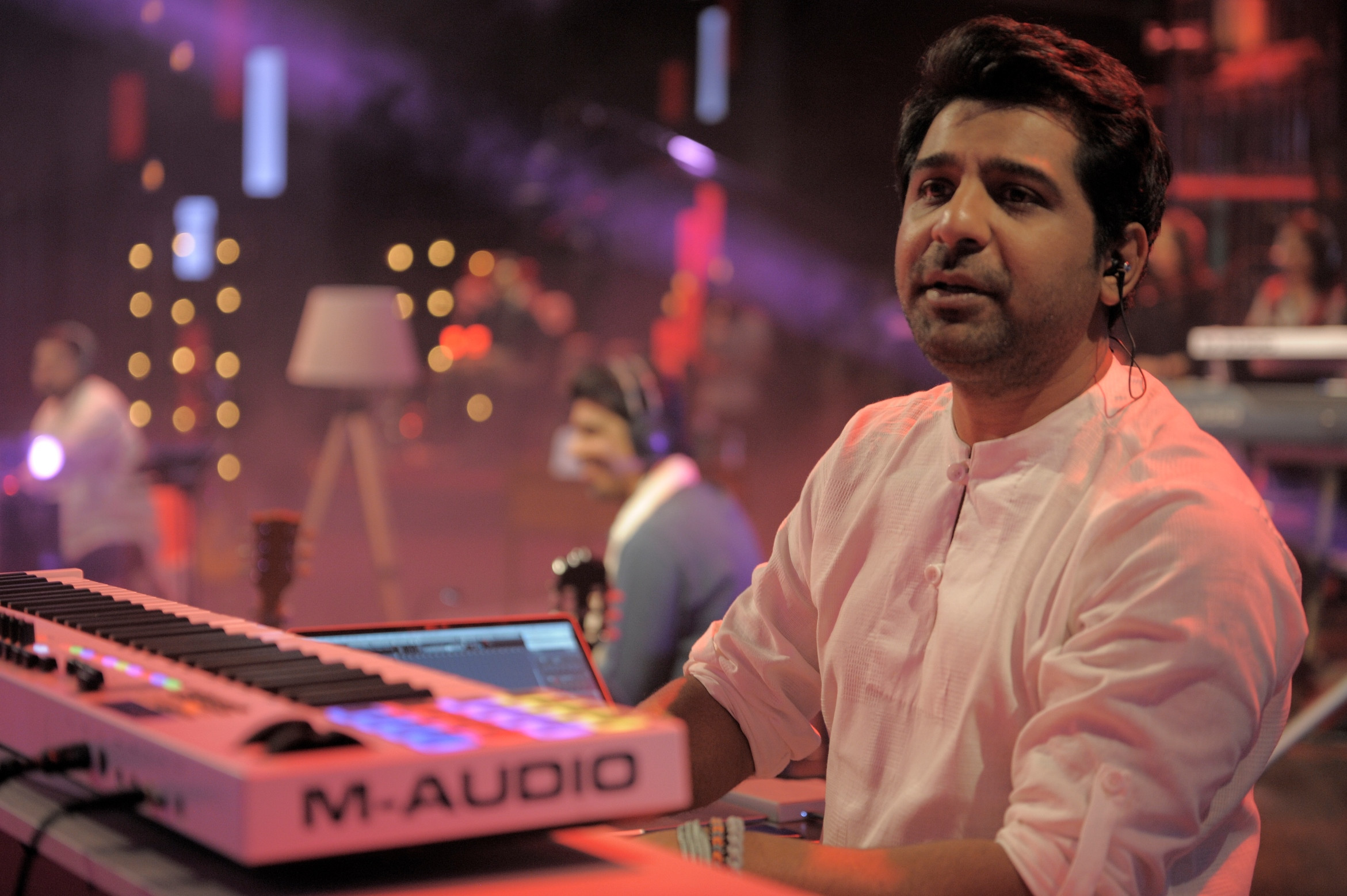
'Baaghi' controversy: Shuja Haider wants TV channels to stand by musicians who compose their OSTs
Haider recently called out Indian composer Rashid Khan and singer Yasser Desai for ‘copying’ his composition.
KARACHI:
Gone are the days when music accessible to a niche could blatantly be ripped off with no one ever finding out until it made it online years later. Today, anyone with access to global audio or video streaming platforms such as Spotify or YouTube can present a clear “then and now” as evidence of what they feel has been plagiarised.
Transposition can also help determine whether a track or part of it, is identical to another. While naked ears cannot warrant a reliable analysis of the same, listeners can still transpose tracks to get an idea of the extent to which one melody maps another. And even if results are insufficient to make a legal claim, provided the disputed melody is written and played in a key other than the “original” melody or a number of notes fail to match, what becomes questionable after an artist – any artist – has been accused of theft, is their artistic integrity.
After Pakistani composer Shuja Haider called Indian composer Rashid Khan’s Piya Re Piya a “copy” of his song Baaghi, the latter pledged to have “never heard” Baaghi or “known about” Haider. Khan, in a conversation with Hindustan Times, also said he would sue Haider for defamation if he failed to apologise, maintaining that “even if four notations of my composition match [Haider’s], I will leave my profession."
Haider, albeit, can vouch that the verse of Piya Re Piya is taken from his OST for the 2017 drama serial. And while he too, planned to take legal action against Khan, he decided to let it slide after “the channel that aired Baaghi, made it clear that it was not bothered by the issue.” Haider also lamented about how Indian artists are let go “scot-free” after “taking as they please” from Pakistani artists.
“After one of my friends shared Piya Re Piya with me, I became angry, not because my song was copied but because it has become a common practice across the border. People warned me that taking legal action would require a lot of time. I couldn’t make that kind of commitment, especially when Urdu 1, for whom I composed the OST, didn’t bother to take a stand for it.” Haider told The Express Tribune.
According to the musician, aside from the obvious lack of awareness, the problem in Pakistan is that artists are “not credited” for their creations by channels, or even informed – let alone asked – when rights of a commissioned song by them are sold off to labels and brands elsewhere. “I have worked on numerous projects in my life without ever signing a written contract. Now it has become a standard protocol. Baaghi’s rights are with the producers of the show but I have a contract and written proof that the song is my composition and was commissioned for the TV series.”
He went on to talk about how songs without credits are considered ghost productions, which gives people the impression that they're either no one's intellectual property, or worse, gives them the free pass to take from as and when needed.
“There are so many ghost writers and producers nobody knows about. People have started considering curators and organisers of the art as artists. The problem with all our channels is, they think of artists as daily wagers. They take our work, pay us and consider the ‘transaction over’. A song that I have written, I can claim as my own at any given time, it is my intellectual property. Even in a work for hire scenario, the lyricists and composers get royalties from sales.”
He then talked about how artists are unable to upload their own music on their social media accounts after sending it to curators. “I got a strike on Youtube twice for uploading my own song, once by HUM TV and once by Sony India.” Haider expressed sadness over the fact that channels have a “system” in place to prevent artists from sharing their own songs but the same system is incapable of stopping other artists from ripping off those songs.
“We are the ones who gave Indians the audacity to copy us without fear of consequences. We cannot fix this until our government creates a system that protects artistic creations,” he added.
As for Khan’s ultimatum, Haider declared, “I got a notification from Hindustan Times and I was shocked. Some assistant of Rashid Khan’s even got a hang of my number and has been WhatsApping me since. They are now saying, ‘Apne tou khud Indian song Katra Katra copy kiya hua hai.’ They’re blaming me instead. These people have no morals.” The Saiyaan singer narrated how actor Imran Abbas, who Khan quoted in his statement to the Indian outlet, also called Haider to clarify he had been “misquoted”.
“As I said, I let it slide. But now these guys are provoking me to take legal action,” Haider went on, “Before Piya Re Piya came out, its singer Yasser Desai covered my Baaghi and shared it on his Instagram. I appreciated it too. How can they have not heard of me?” asked the musician.
Desai’s purported cover of Baaghi is unavailable on his social media.
“Rashid Khan has only added murkiyan (melodic phrases) to the verse. Usne sirf lachak walay notes hata ke usko seedha kardiya hai. I would like to tell Rashid Khan that agar ap sirf aik dhun ki murkiyon ko seedha karke gaana banatay ho tou tab bhi ye chori hai."
Haider concluded by elaborating on how a verse is not just a part of the song but its “identity”. “The verse is the head, the face of the song. No one will recognize you from your hands, people will recognize your face. Every other part of your body is connected to your head and is an extension of the same. If he’s copied the verse of my song, his remaining song is simply an extension of that verse. So, I will stand by my statement."
Piya Re Piya has so far crossed 26 million views on YouTube.
Have something to add to the story? Share it in the comments below.
1719921789-0/dua-lipa-(1)1719921789-0-270x192.webp)














COMMENTS (5)
Comments are moderated and generally will be posted if they are on-topic and not abusive.
For more information, please see our Comments FAQ